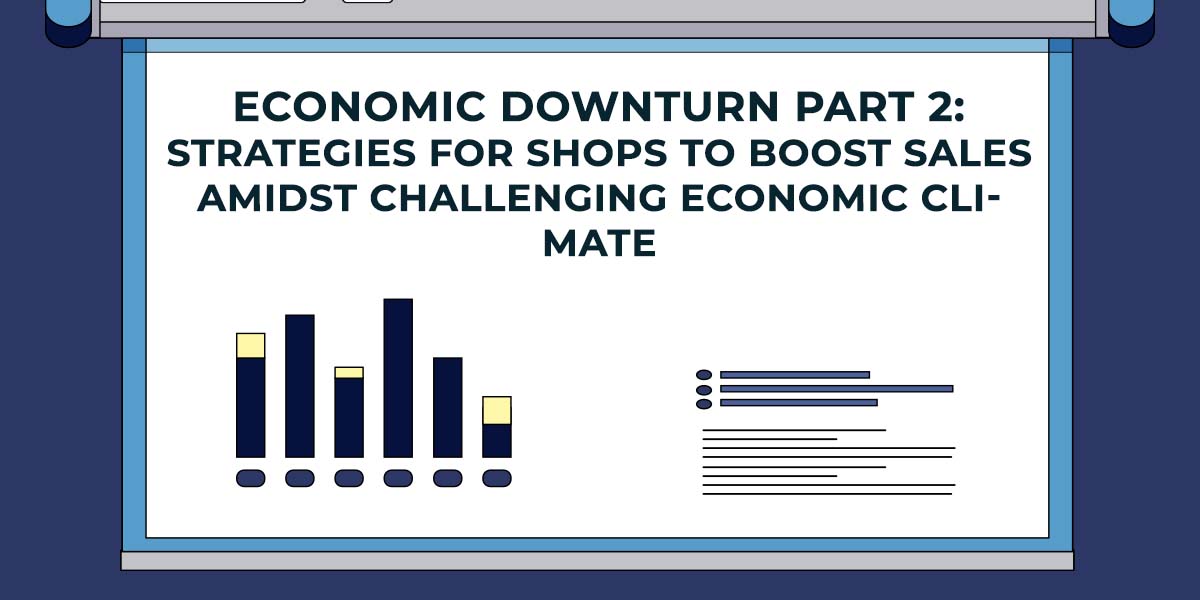Economic Downturn Part 2: Strategies for Shops to Boost Sales Amidst Challenging Economic Climate
In Part 1 of our series on thriving during economic downturns, we tackled key strategies like smart pricing, e-commerce optimization, and building customer loyalty.
Now, it’s time for Part 2, where things get even more exciting! We’re diving into the world of brand advocacy, exploring innovative marketing campaigns, and mastering financial planning for long-term success. Get ready for some actionable insights to help your business not just survive but truly flourish during tough times.
Brand Advocacy
Satisfied and loyal customers are more likely to refer friends and family, amplifying your reach through word-of-mouth. This organic form of marketing can be incredibly effective in attracting new customers and building a strong brand reputation.
Referral Programs: Implement a referral program where loyal customers earn rewards for referring new customers. This can include discounts, free products, or bonus loyalty points for both the referrer and the new customer.
Social Media Engagement: Encourage loyal customers to share their positive experiences on social media. Create shareable content and provide incentives, such as entry into a prize draw, for tagging your brand and using branded hashtags.
Testimonials and Reviews: Invite satisfied customers to leave reviews and testimonials on your website and third-party review sites. Displaying these positive reviews prominently can build trust and credibility with potential customers.
Community Building: Foster a sense of community among your customers by hosting events, both online and offline, where they can connect with each other and your brand. This can include product launches, exclusive previews, or loyalty program member meetups.
Exclusive Content: Provide loyal customers with access to exclusive content, such as behind-the-scenes looks at new products, interviews with designers, or early notifications of upcoming sales. This makes them feel valued and part of an exclusive group.
Customer loyalty programs are a vital strategy for driving repeat purchases, collecting valuable customer data, and fostering brand advocacy. By incentivizing repeat business, gaining insights into customer behavior, and encouraging word-of-mouth referrals, loyalty programs can significantly enhance your business’s resilience and growth during economic downturns. Implementing a well-designed loyalty program can build a loyal customer base that supports your business through challenging times and beyond.
Implementation Tips for Customer Loyalty Programs:
Tiered Rewards: Offer different levels of rewards based on spending thresholds to encourage higher spending.
Exclusive Offers: Provide members with exclusive access to sales, new products, or events to enhance their sense of belonging and value.
Easy Enrollment: Simplify the sign-up process and clearly communicate the benefits to encourage more customers to join.
Innovative Marketing Campaigns
Creative marketing campaigns can help your business stand out in a crowded market. Leveraging unique and engaging marketing strategies can attract attention and drive sales even when consumer spending is down.
In an economic downturn, standing out in a crowded market is essential for maintaining and boosting sales. Creative marketing approaches can help you connect with your audience, drive engagement, and differentiate your brand from competitors. Here are some innovative ideas to consider:
Storytelling
Storytelling is a potent tool for forging emotional bonds with your audience. By weaving compelling narratives about your products or brand, you can effectively underscore their value and uniqueness, significantly enhancing the impact of your marketing efforts.
Share testimonials and stories from satisfied customers who have experienced the benefits of your products firsthand. These real-life experiences not only foster trust but also showcase the practical value of what you offer. Additionally, recount your brand’s journey, encompassing its origins, mission, and core values. This approach humanizes your business and deepens the connection with your audience. Consider detailing the meticulous process involved in creating your products, from sourcing materials to the craftsmanship invested. Such transparency can elevate the perceived quality and value of your offerings.
Highlight stories that illustrate your brand’s social and environmental impact. Whether through charitable contributions, sustainable practices, or community engagement, these initiatives resonate strongly with socially conscious consumers.
Collaborations and Partnerships
Collaborations and partnerships with complementary brands or influencers can expand your reach and add credibility to your marketing efforts. These alliances can introduce your brand to new audiences and create mutually beneficial relationships.
- Partner with brands that share a similar target audience but offer different products. Joint marketing campaigns, co-branded products, or bundled offers can attract customers from both brands.
- Collaborate with influencers who align with your brand values and have a strong following in your niche. Influencers can provide authentic endorsements and create engaging content that promotes your products to their audience.
- Host or participate in events with partner brands, such as pop-up shops, online webinars, or joint social media live sessions. These events can generate buzz and drive engagement.
- Work with complementary brands or influencers to create co-branded content, such as blog posts, videos, or social media posts. This content can provide added value to your audience and increase your brand’s visibility.
Interactive Content
Interactive content dynamically engages customers, encouraging them to participate and interact with your brand actively. This type of content can increase engagement, gather valuable insights, and make your marketing more memorable.
Types of Interactive Content:
- Quizzes: Create fun and informative quizzes related to your products or industry. Quizzes can be a great way to engage customers, provide personalized recommendations, and collect data on customer preferences.
- Polls and Surveys: Use polls and surveys to gather feedback and insights from your audience. These tools can help you understand customer needs, preferences, and satisfaction levels, guiding your marketing strategies and product development.
- Interactive Videos: Develop videos that allow viewers to make choices or interact with the content in real time. Interactive videos can enhance engagement and provide a more immersive experience.
- Gamified Experiences: Incorporate gamification elements into your marketing, such as challenges, competitions, or reward systems. Gamified experiences can increase customer participation and loyalty by making interactions with your brand more enjoyable.
- Virtual Try-Ons: For products like apparel, accessories, or cosmetics, use augmented reality (AR) technology to offer virtual try-ons. This interactive feature can help customers make informed purchasing decisions and enhance their shopping experience.
By integrating storytelling, collaborations and partnerships, and interactive content into your marketing campaigns, you can effectively engage your audience, expand your reach, and differentiate your brand in a competitive market. These innovative strategies can help you build stronger customer connections, drive sales, and thrive even during economic downturns. Embracing creativity and adaptability in your marketing efforts will position your business for long-term success and resilience.
Financial Planning for Long-Term Sustainability
Sound financial planning is essential for navigating economic downturns and ensuring long-term sustainability. By managing finances effectively, shops can weather economic challenges and position themselves for future growth.
Financial Strategies:
- Cost Management: Review and optimize your operating expenses. Look for areas where you can reduce costs without compromising quality or customer service.
- Cash Flow Management: Maintain healthy cash flow by closely monitoring receivables and payables. Consider short-term financing options if needed to cover gaps.
- Diversification: Explore new revenue streams or product lines to reduce dependence on a single source of income. Diversification can mitigate risks and open up new growth opportunities.
Planning Tips:
- Budgeting: Create a detailed budget that accounts for potential downturn scenarios. Regularly review and adjust it based on actual performance and changing market conditions.
- Reserve Funds: Build and maintain a reserve fund to cover unexpected expenses or take advantage of opportunities that arise during challenging times.
- Professional Advice: Consult with financial advisors or accountants to gain expert insights and ensure your financial strategies are robust and effective.
Navigating an economic downturn requires a proactive and multifaceted approach. By understanding the challenges, implementing strategic pricing, embracing e-commerce, fostering customer loyalty, innovating in marketing, and planning financially, retail shops can not only survive but thrive during tough economic times. Stay adaptable, keep your customers at the forefront, and continuously seek new ways to add value, and your business will be well-positioned to emerge stronger from any economic challenge.
For more insights and strategies on boosting sales and sustaining growth, visit No to the Quo.
Digital Marketing No To The Quo



